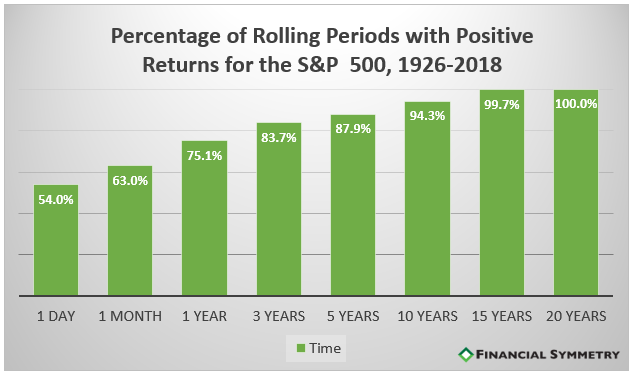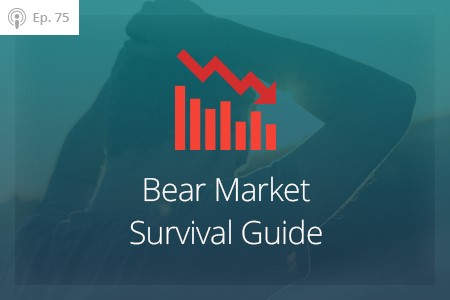
“Everyone has a plan until they get punched in the mouth.” Many investors are sharing Mike Tyson’s sentiment after the worst single day in the stock market since Black Monday.
The short-term losses appear to be a direct result of the COVID-19 pandemic. However, there are typically many factors that lead to bear markets and recessions. Many only become clear in hindsight.
What We Know
The current outbreak is concerning from both human and economic aspects. The vast majority of those who become ill from COVID-19 will experience mild symptoms and recover fully. This virus is not equivalent to much more deadly viruses like Ebola or the 1918 flu. However, many of those who become ill will need intensive care in a hospital and some will not recover.
The unprecedented steps being taken to slow down the spread of the virus are primarily about trying to prevent too many people becoming seriously ill at one time as we have a limited supply of intensive care units in our hospitals. By practicing social distancing like cancelling events and self-quarantining, it is possible to lower total infections and spread out the serious illnesses to prevent our hospitals from becoming overwhelmed. In countries where intensive care units are not overwhelmed, the fatality rate appears to be under 1% of those infected, but where intensive care units have been overwhelmed, it is much higher, more like 3%.
In terms of economic impact, there is certain to be a significant short-term reduction in commerce from social distancing measures, but whether there will be a longer-term impact is unknowable at this point. The stock market hates uncertainty which is why there has been such a negative reaction.
What Should Investors Do?
Experiencing bear markets feels terrible. Panic sets in. The desire to do something is so strong it leads many to take actions that ultimately prove harmful if not detrimental to their financial plans. While the Coronavirus is certainly scary, this is not the first crisis we have experienced. Over the past few decades we have lived through a tech bubble, 9/11, the Greek Debt Crisis, a downgrade of US treasury bonds, Brexit, and a financial crisis to name just a few. Now that we are here again, how should we react?
After taking a few deep breaths, we need to refer to our financial plan. The plan should be the basis for how much of your life savings is invested in the stock market and set expectations for how much you will either be adding to or withdrawing from those savings over the next several years.
We are here to help you continue implementing that plan through difficult conditions like these. The actions we are taking for you now include:
- Revisiting your long-term plan to ease your concerns and highlight your allocation to safe assets
- Shifting from cash and bonds into stocks at lower prices (the stock market is on sale!)
- Tax loss harvesting to help you keep more of your hard-earned dollars
- Evaluating Roth conversions to shift funds into tax free accounts while asset prices are depressed
This does not change the fact that disciplined investing is difficult. However, preparing for a stock market crash prior to experiencing one can help you digest the short-term losses. This is why periodic rebalancing is so important. Trimming stocks after all time highs in 2019 felt wrong, but it put us in a better position to weather markets like this one.
While you may never be excited about stock market declines, you can be ready to take advantage. If you are retired and actively making withdrawals, now is the time to revisit your safety bucket comprised of cash and bonds. If this is enough to cover your expected cash needs over the next 5-7 years, then you can allow the equity portion of your portfolio to ride the stock market roller coaster that will provide higher long-term returns. If you are actively saving, a bear market is actually a great opportunity to buy more stocks and benefit from your retirement contributions going in at low prices.
As painful as bear markets can feel, they tend to be much shorter than bull markets. The average length of your typical bear market is a year, contrasted with the average bull market at 4.5 years. Fortunately, investors earn the long-term return of stocks almost purely as a reward for patiently enduring their occasional declines.
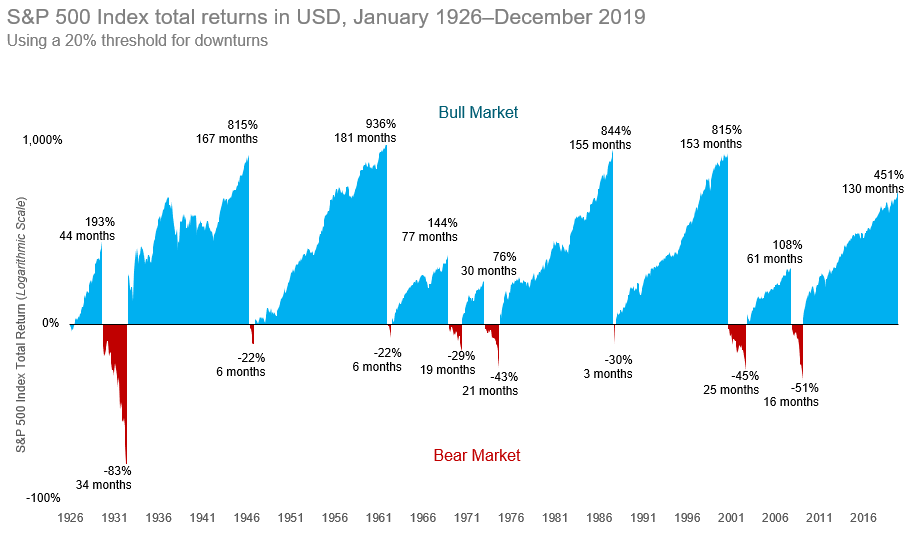
Bear markets are also a normal occurrence and typically occur every six years, as demonstrated below.
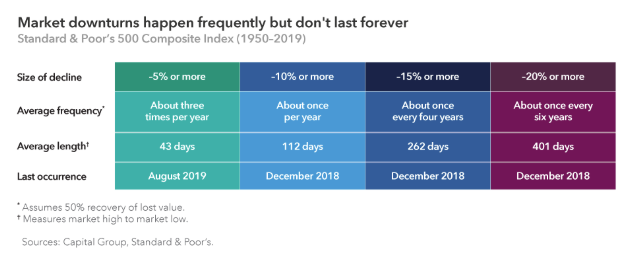
How Can You Cope During a Bear Market?
Bear markets can be scary to watch and unfortunately, the news channels cover them constantly. People pay more attention in bear markets since they are sensationalized by the news media. As hard as it is, it’s even more important in these moments to follow your strategy. If you feel like you need to get out immediately and go to cash, then you may be taking too much risk. Unfortunately, we can’t follow our instincts when it comes to investing. Our instincts influence us to stop the bleeding and sell stocks to hold more cash. The problem with that strategy is big up days occur very close to big down days. So, when volatility spikes, staying in your seat matters more than side-stepping short-term losses. In fact, time has been the great healer in equity investing, in the sense that the temporary declines have historically passed away.
How Do You Recognize a Bargain?
The silver lining of a bear market, is the buying opportunity they create. For many investors that are steadily saving in their investment accounts, bear markets present bargains for higher long-term returns. But how do you know the best time to invest more in stock? How do you ensure that you are not buying too early? Studies show the best strategy is to invest a lump sum upon receiving, as your average long-term returns are higher with stocks vs. other alternatives. The bigger the decline, the higher the return, one, three and five years after the equity price drops.
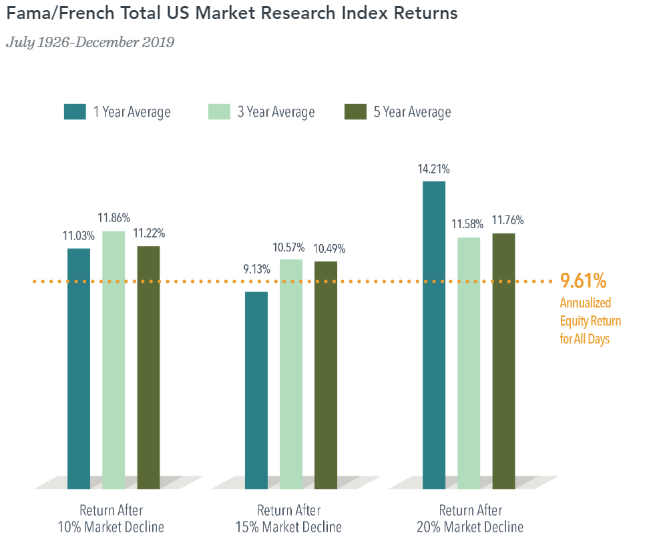
What is our Plan?
Given the history of past viral outbreaks, including the 1918 flu, we think it is wise to lean towards there being minimal long-term impact. Current stock prices appear to be low enough to provide significantly higher returns than fixed income alternatives where interest rates for high quality instruments are below the dividend yield on most stocks.
In light of many closings and cancellations related to COVID-19, we want to assure you that we will continue serving you throughout. Our systems and processes are set up so we can securely work remotely if the need arises. In the short term we will be limiting in person meetings to limit the spread of germs. As for accessing your financial information, you can now securely view your net worth, portfolio value, goals and accomplishments on your dashboard in Client Center any time.
Please contact your Financial Symmetry service team if you have any questions or if you would like to schedule a virtual meeting or phone call to discuss your specific situation in more detail.
We’ll leave you with the wisdom of Warren Buffet who shared, “widespread fear is your friend as an investor because it serves up bargain purchases. Personal fear is your enemy and it will also be unwarranted.”
Resources & People Mentioned
- Episode 71 – How to Ignore the Stock Market Noise
- GMO Article – Burned by Bubbles
- Cornoavirus Concerns
- Lower Stock Market Means Higher Future Returns
- What Investment Decision Process Should You Implement?
- October 2014 – How to not Worry about a Falling Stock Market
- September 2011 – The Confidence that Comes From Experience
- May 2010 – Nervous about the Stock Market?
- Our Communication in February 2009 – Financial Security Plan
- From November 2008 – Gameplan for Difficult Times
Listen Here:
Episode from January 2019 we recorded with tips of how to respond in a Bear Market.

